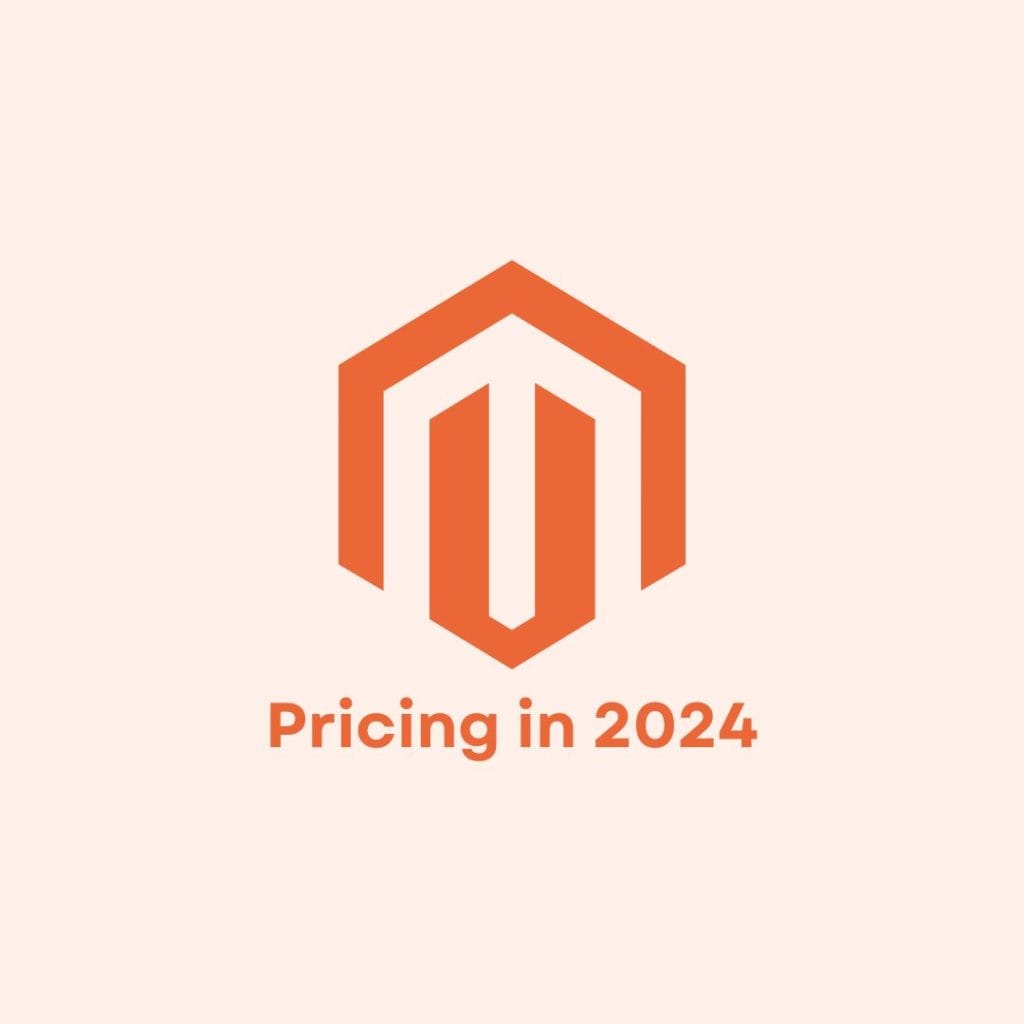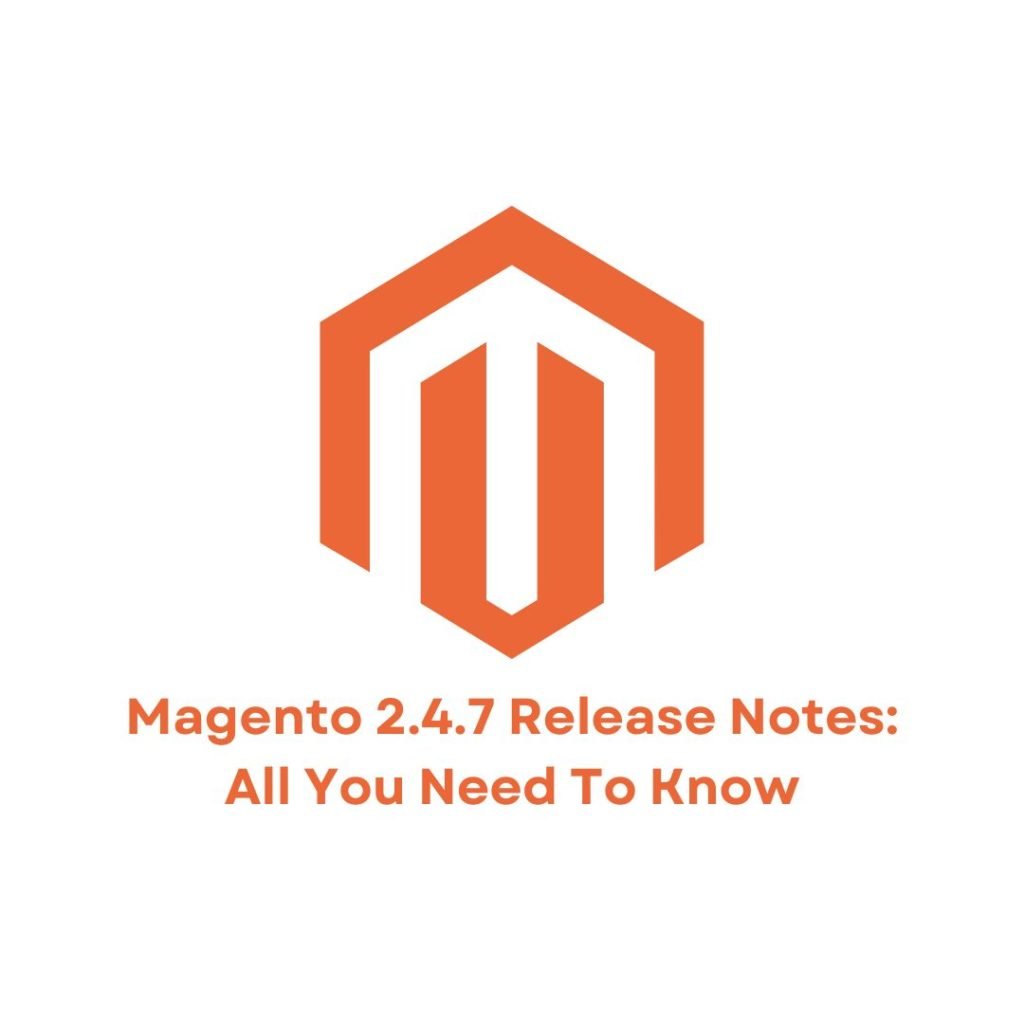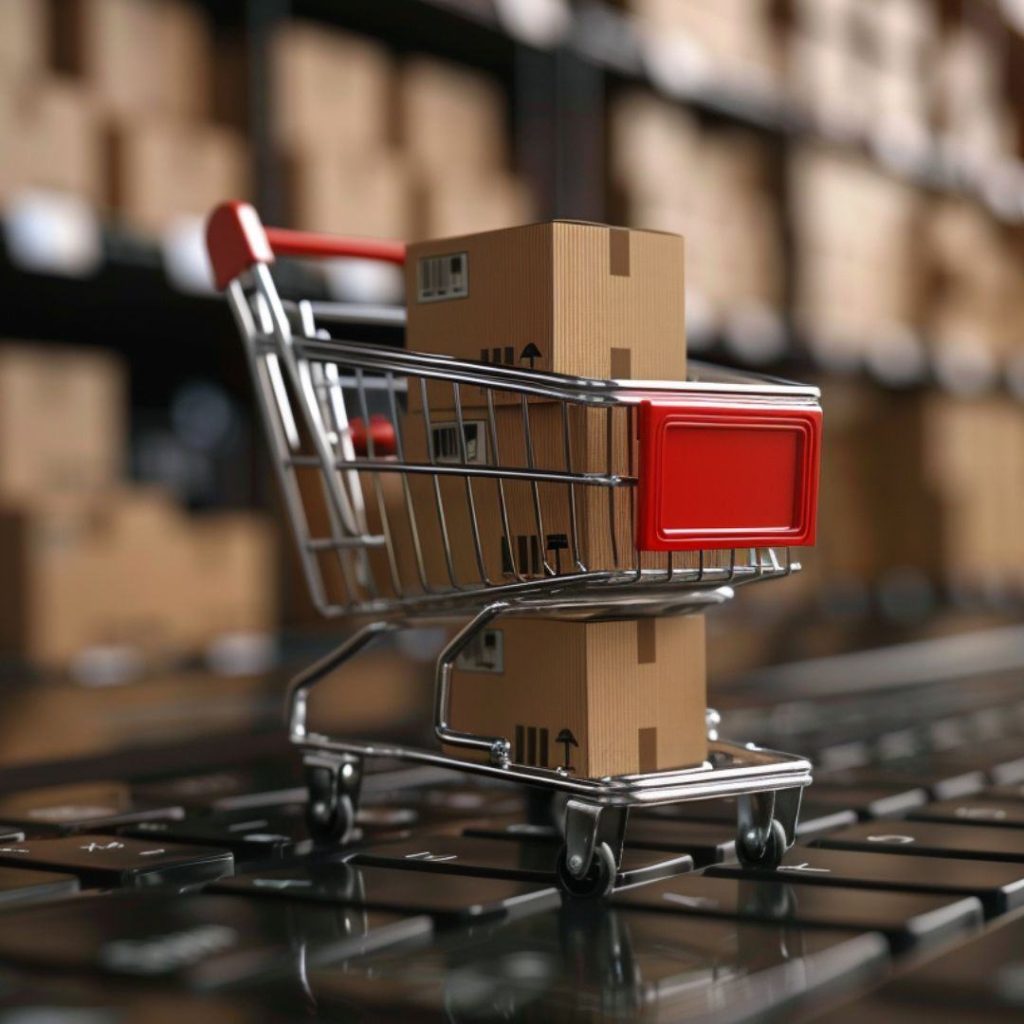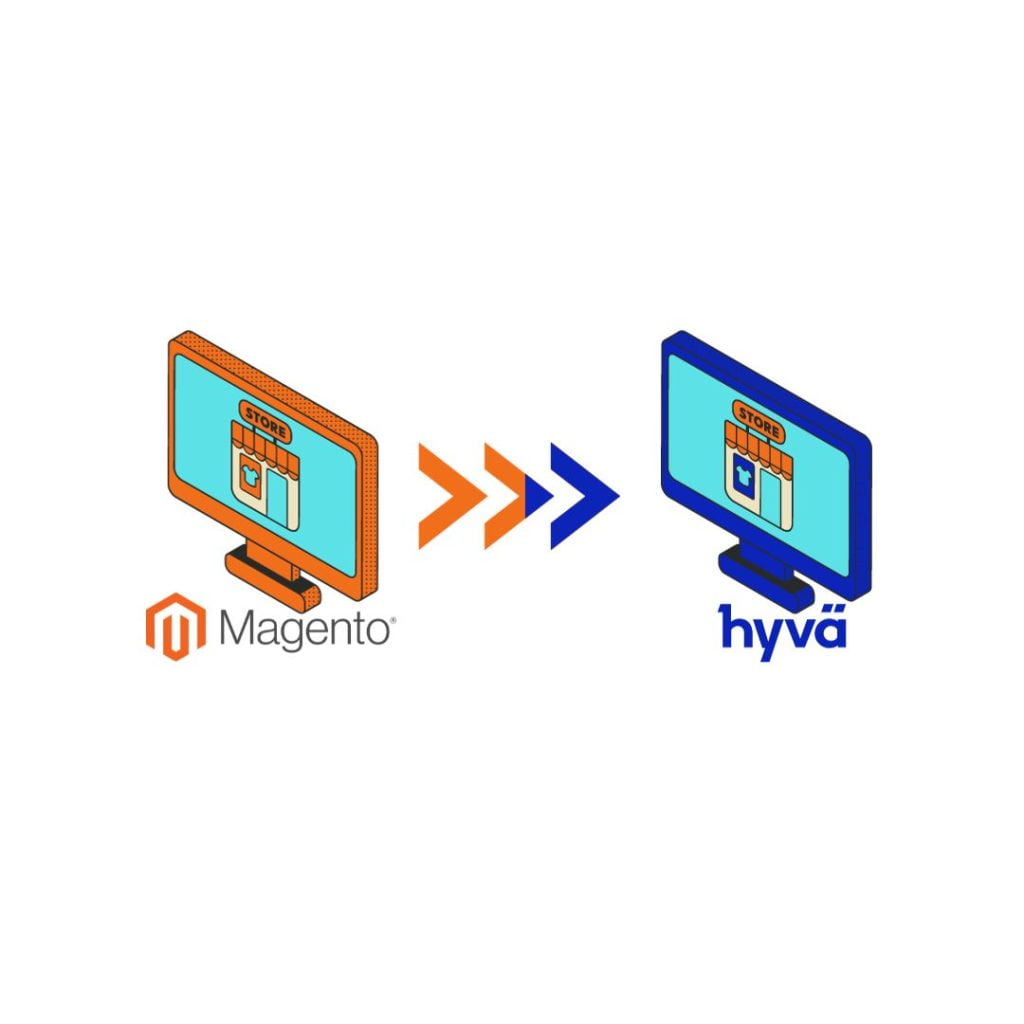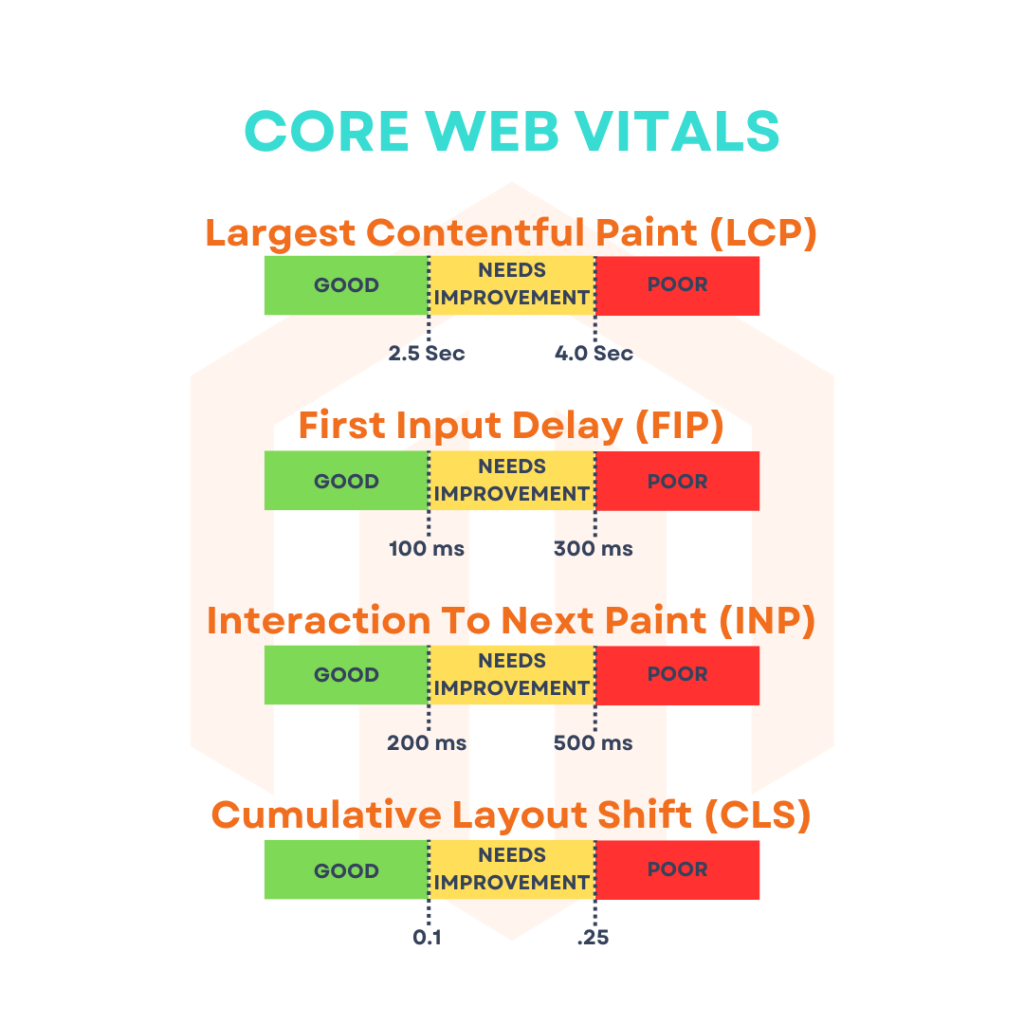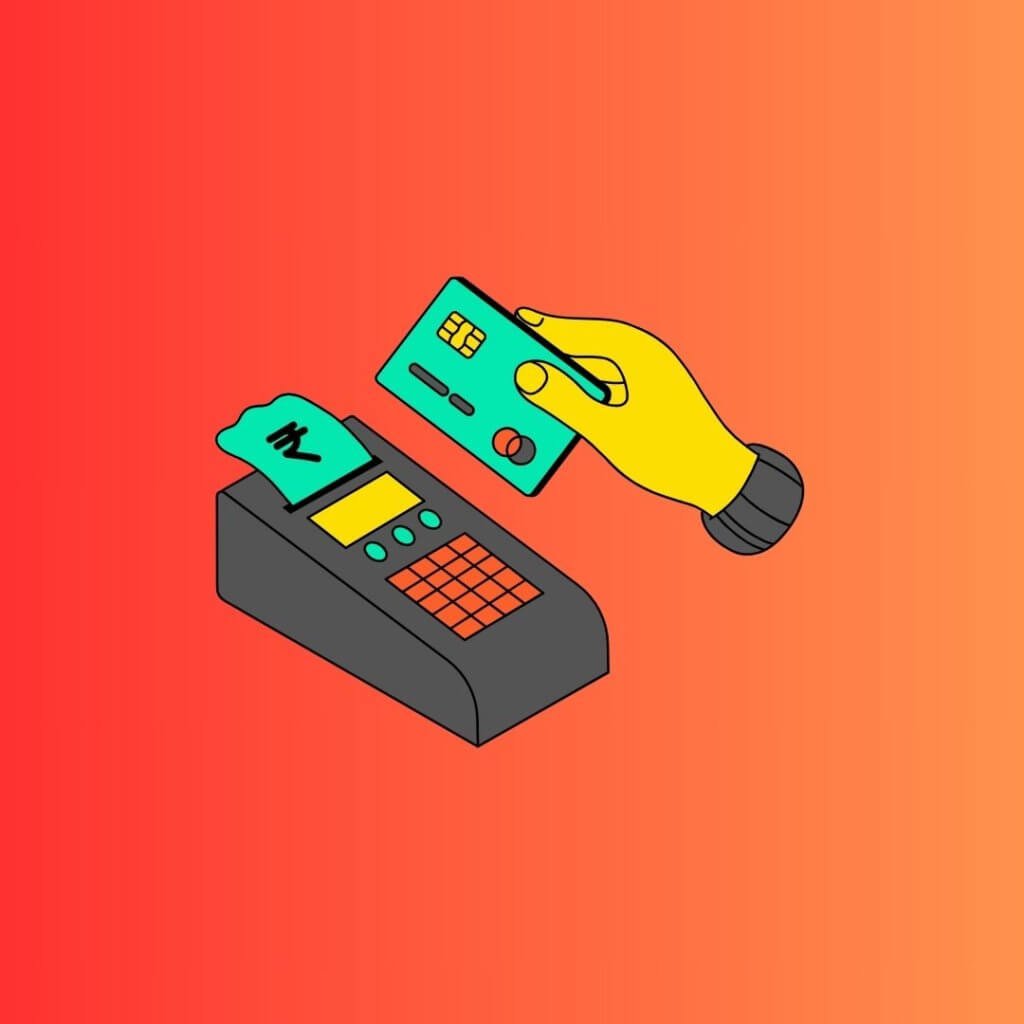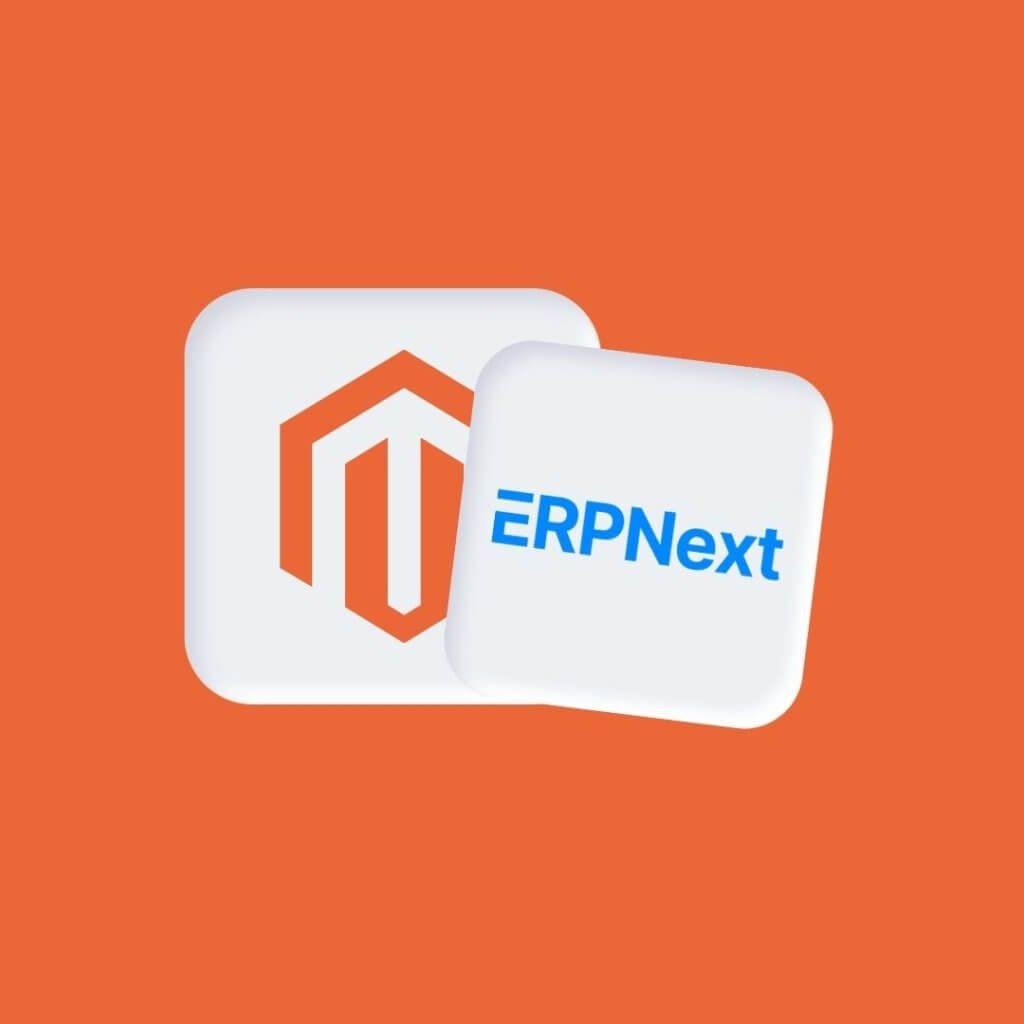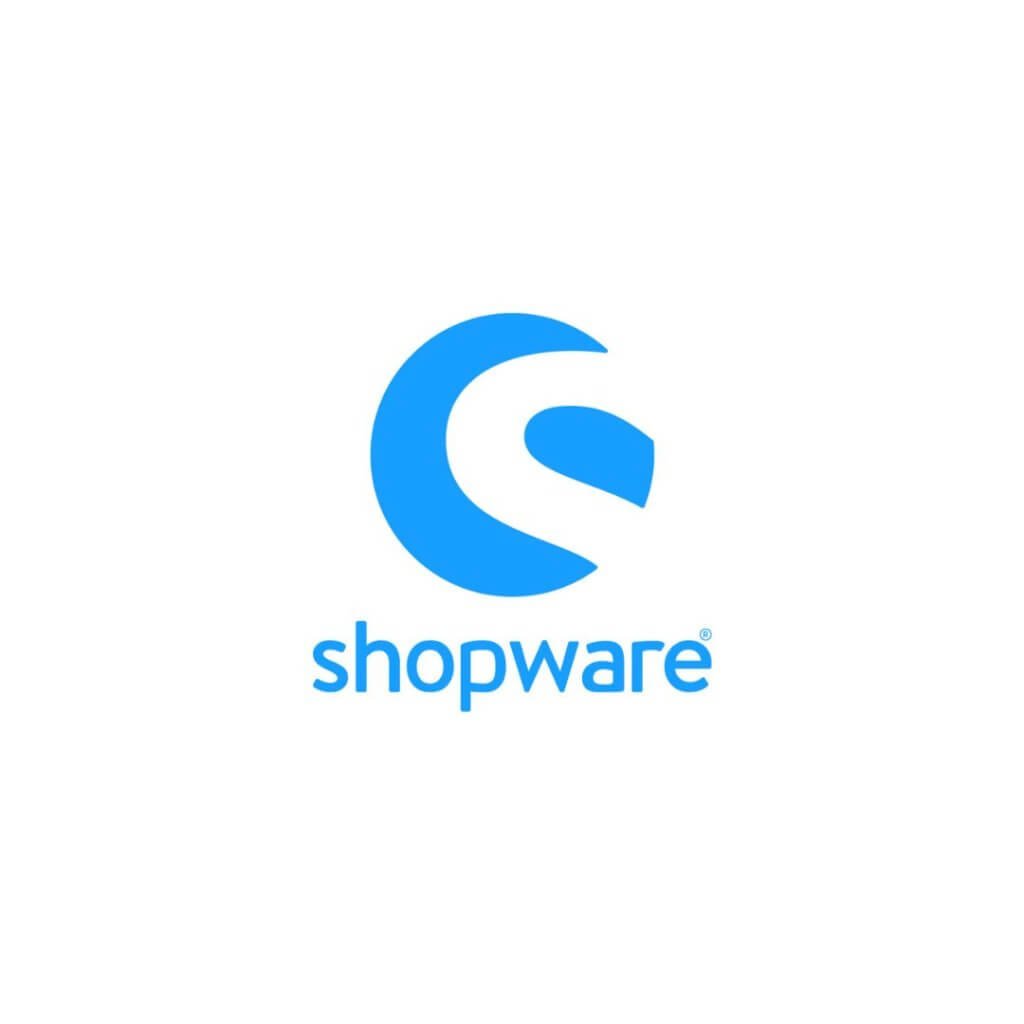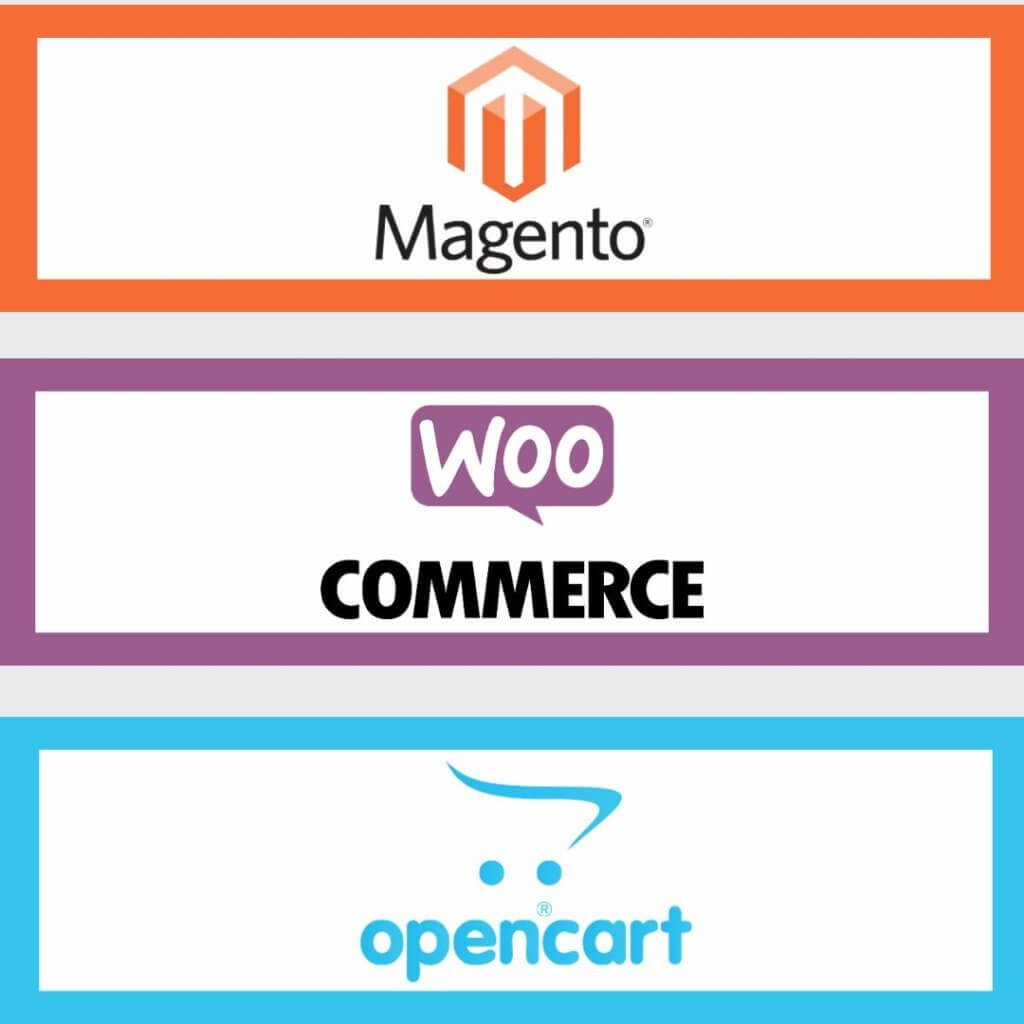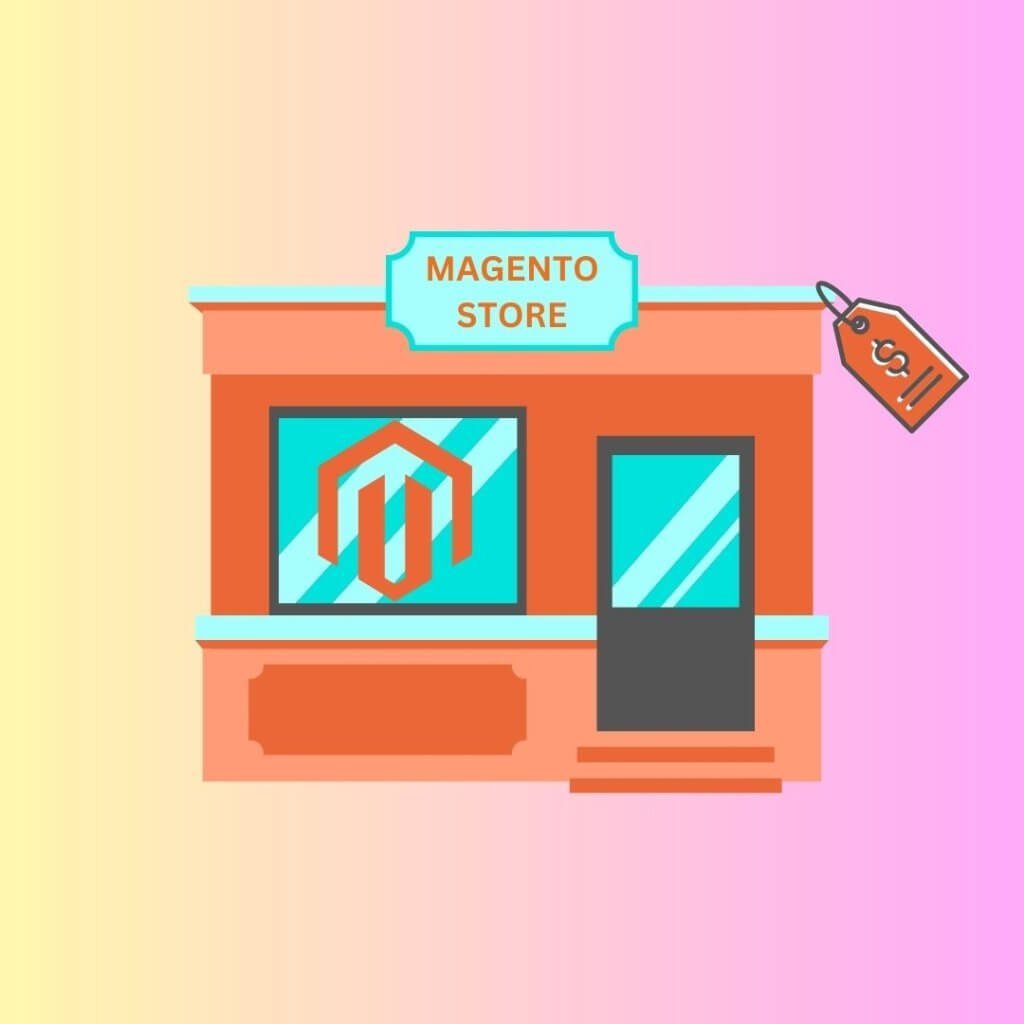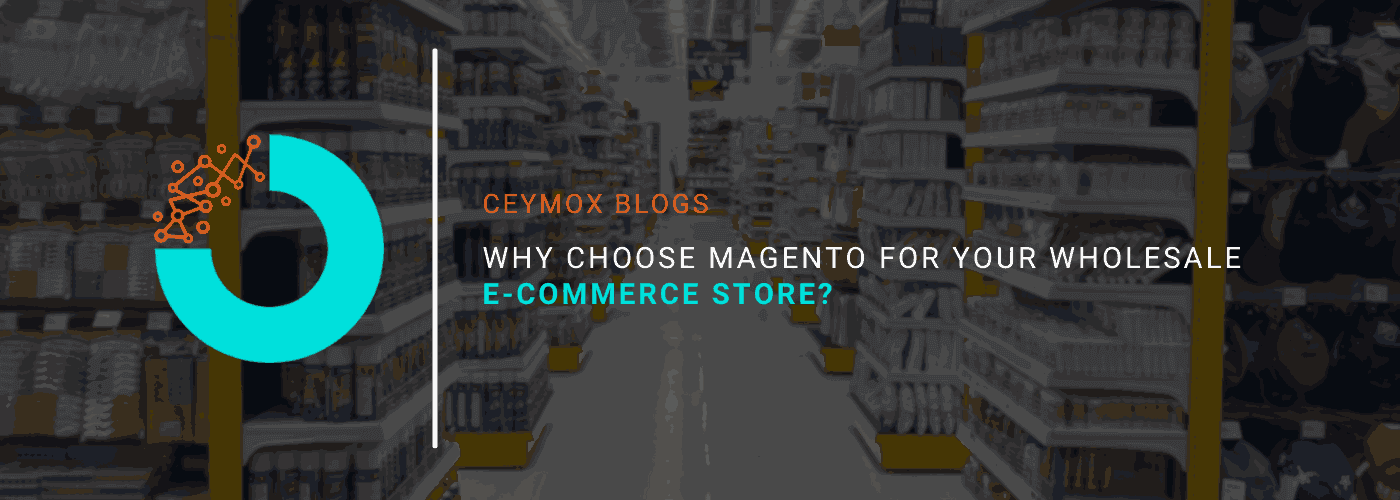
If you think about watching a movie based on business-to-business e-commerce in 2023, you would rarely find any scene of 20-30 people sitting together in a meeting. And it is not because of any shift in cinematography instead it is the reduction of real life thanks to the evolving technology and catalyst of COVID-19.
Despite the numerous myths flowing in the industry, B2B wholesalers are going online to do business.
Just a few years ago, the B2B wholesalers were not very optimistic to take their businesses online considering the risks associated with the huge order volumes and costs. The same is true for the B2B buyers who preferred in-person transactions.
However, on the other side, the Mckinsey study mentions that 65% of the B2B wholesalers now have e-commerce capabilities and two-thirds of the B2B buyers prefer digital interaction instead of handling things in person.
Ceymox Technologies, the best B2B Magento e-commerce development company in India, will provide you with consultation with all the underlying secrets regarding e-commerce for wholesale business. In this article, we will understand in-depth what wholesale e-commerce is, how it can help you as a B2B business, why Magento is the best e-commerce platform for wholesale business, and how Ceymox Technologies can help you in setting up your wholesale e-commerce store. Let’s begin with the basics.
Wholesale E-commerce
Introduction:
In the B2B wholesale e-commerce model, a company sells products or services in huge quantities to other businesses online at comparatively lower or discounted prices. The B2B seller is an important intermediary in the supply chain of a manufacturer to a retailer.
In opposite to the B2C business model in which a retailer sells products directly to consumers in small quantities, a B2B seller indulges in mostly bulk orders only. But the difference is not limited to this, there are more. Let’s know about them.
B2B vs. B2C E-commerce:
In simple words, B2B involves selling to businesses, while B2C indulges in selling to consumers. The buying process and behaviour of the parties are here different which also affects the e-commerce requirements of these segments. Let’s understand in detail how these two business models differ from each other.
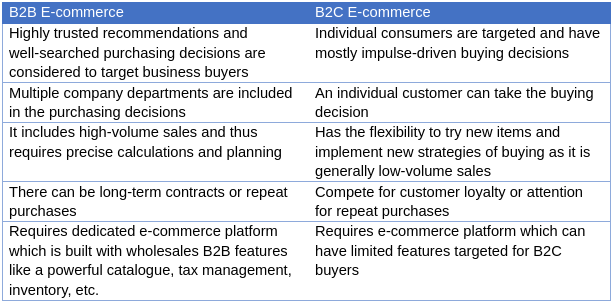
At the end of the day, selling online is beneficial regardless you are a B2B or B2C business. We have already mentioned several times the benefits of e-commerce in retail; now let’s explore how it is good for wholesalers as well.
Benefits of E-commerce for the B2B Wholesale Businesses:
The B2B wholesale e-commerce offers a plethora of benefits. It will not just simplify the buying journey, but it will also increase revenue, improve customer relationships, and a lot more. Let’s know the top 6 benefits of B2B wholesale e-commerce:
a. Simpler buying process:
B2B buyers are interested in the product catalogue and prices and have no time for the extra frill that a B2C buyer may like. They want a simple, straightforward buying process with maximum transparency of products & prices. But it is not the only thing they commend.
Today’s B2B buyers want self-service while identifying and evaluating new suppliers and making orders. A self-service portal will not just let B2B buyers submit their tickets, they would also be able to check their purchase history, download invoices, and much more. It will reduce the ordering process by making these tasks autonomous.
Also, just like B2C, B2B demands to be present at every channel and every device. The young B2B buyers want an omnichannel and cross-platform experience on whatever platform they use I.e. a website, app, or any other channel. A B2B-focused e-commerce platform like Adobe Commerce (Magento) can face these obstacles or challenges with ease.
b. Automated wholesales processes:
If you don’t want to lose your employees while doing business expansion, you must put tasks in automation throughout the wholesale e-commerce journey.
There are several aspects of the wholesale e-commerce cycle in which manual tasks can be automated like billing, real-time inventory management, checkout, quotes, etc. Here you require the capabilites of artificial intelligence, machine learning and data analytics.
You can power the search of products and catalogues with AI which will not only give smart predictions but will also give personalized results based on earlier purchase behaviour.
The customers would be able to make fast orders by the automated quote placement: as soon as the sales representative reviews and confirms the quote. Then no such human intervention would be required to make the order. Another possible scenario can be of integrating an automated paperwork tool for filing taxes in the various countries you operate.
Automating manual tasks of the buying cycle will allow your team to focus on more critical tasks that nurture and build client relationships or marketing strategies instead of doing routine work.
c. Increase revenue:
At the end of the day, revenue and profit are among the foremost priorities of any business. In wholesale business, the goods are sold in large quantities and at lower prices which makes it challenging to grow revenue. B2B buyers take an elongated time to make buying decisions, and huge competition makes it more challenging.
However, there are still many ways by which a B2B wholesale e-commerce site can streamline this process:
- Maintaining an online presence of your business will not just give you a new platform but will also reduce the operating costs of a physical store.
- An online presence will help you take your business hit the international markets and create a global footprint of your business.
- ERP integration will help you with real-time management and monitor the inventory levels 24 x 7.
- The B2B buyers can get an overview of the inventory and the catalogue from the wholesale website and it will help to make an informed buying decision.
- The low-profile buyers get more time to make purchase decisions and the sales representatives don’t need to intervene in them.
d. Data-driven decision-making:
As we all know, data is the new oil in today’s time. Data helps you analyze the performance of your business, make accurate predictions, and make informed decisions. But the data is not limited to just customers only.
Company-wide information is also important. You can manage the resources and workflows efficiently by understanding the different department dynamics. And an e-commerce wholesale platform like Magento can capture and display this data in seconds. These analytic features are built-in in Magento while other platforms require third-party integration.
e. Better UX and Customer relationships:
It is imperative to provide the next-level customer experience if you want to thrive in today’s competitive business environment. As per the research of Gartner, customer experience is responsible for nearly 66% of customer loyalty in multiple forms – from repeated purchases to recommend to other buyers.
And a fast, streamlined, and easy-to-navigate e-commerce website is among the most important factors that improve the experience.
f. Scalability:
Just like any B2C business, a B2B business also wants to expand in new markets and land more clients. But the growth of business also relies on its technical components too. Thus, flexible and scalable e-commerce platforms become a necessity for the wholesale business to serve more clients in multiple locations.
For instance, the e-commerce platform should support multiple currencies and locations to help you expand your market geography without a full migration of your store which will be too costly.
All these benefits are available in Magento which can support all your B2B wholesale commerce activities online. Magento is a feature-rich B2B e-commerce tool which gives you a lot of factors to invest in and develop a highly advanced B2B e-commerce store for your business.
How to choose an e-commerce platform to power your wholesale e-commerce website?
The chosen B2B e-commerce platform should serve your business goals, cater to the client’s requirements and should be a secure space. If you are in a nascent stage and sell in smaller quantities then integration with popular marketplaces such as Amazon, and eBay will be enough.
To reach new markets, mid-sized and enterprise-level wholesale businesses need an independent B2B e-commerce platform.
Here are a few factors to consider while choosing your platform:
1. Costs:
Generally, almost every e-commerce platform offers multiple plans to wholesale businesses with varied feature sets. The higher the cost, the huge will be the number of features. Apart from the license fee of the platform, you have to also look out for design customization, integrating 3rd party software, and other custom-built extensions.
First, you must write down functional and non-functional requirements before choosing any platform for your online store. Discuss the budget with all the company’s stakeholders and secure their support for the creation of the wholesale platform.
Thereafter, find an experienced B2B e-commerce development company and share the requirement with them. Discuss your requirements in detail in a meeting with the company and what would be best available within your budget, business strategy, and goals.
2. Advanced Search and Catalog Management:
Search is one of the first touchpoints by which the customers interact with your e-commerce store whether B2C or B2B and if your search gives irrelevant results then you must be worried about it. It will lead to losing your customers.
Your chosen e-commerce platform must have an AI in-built advanced search functionality with filter options. The platform should also offer real-time inventory analytics and catalogue management functionality. It would be immensely better if the platform is also powered with AI analytics to provide customized experiences to the clients as per their purchase history.
3. Flexible Integrations:
If you want to add many 3rd party features and functionalities to your store then the platform should be integration-friendly. It also saves you money and time as integrating a pre-built solution is easier than developing a complete solution from scratch. These are some integrations that you must consider:
- CRM (Customer Relationship Management) systems
- ERP (Enterprise Resource Planning) software
- PIM (Product information management)
- SEO and digital marketing tools
- Analytical tools like Google Analytics
- CMS (Content Management Software)
- Payment gateway integrations
4. SEO and Digital Marketing features:
If you have plans to sell in different countries and want to work with international brands then the chosen platform must have multi-store and multi-language marketing capabilities. Why? To address the demographic difference in search queries, special requests from B2B buyers, and wholesalers’ pain points.
You must be able to manage your content across all brands and locations from a single dashboard or admin panel while sharing the insights with other departments. By doing this, you’ll have everyone on the same page, improving departmental workflow coordination and enhancing the customer experience.
5. Payment Features:
With the multiple payment options, the customers get flexibility and convenience to purchase as they can find their preferred payment method on the list. In B2B transactions, it is important to have transparent invoicing methods and the customers should be able to pay by check and card. But the options shouldn’t be limited to only these.
More than two-thirds of the B2B purchase decisions are made by the millennials who are the rapid users of the advanced technology and are the driving force of B2B commerce. These users prefer to use mobile devices for the purchase and that is why you must also offer secure mobile payments.
Moreover in the B2B industry, certain B2B buyers also prefer to make payment much later after the purchase. The Buy Now, Pay Later (BNPL) finance feature can be useful here.
These were the key elements to take into account when selecting the B2B e-commerce platform.
Why Magento is the best Platform for Wholesale B2B E-commerce?
Being one of the most robust and powerful e-commerce platforms, B2B businesses are choosing Magento as it can handle specific B2B needs. The enterprise edition of Magento “Adobe Commerce” comes with a variety of built-in features. The Magento B2B features outclass all other e-commerce platforms. Set up your Magento B2B eCommerce store and start seeing an increase in conversions and revenue. Here are the features that make Magento best for wholesale e-commerce:
1. Request for Quote:
Request for Quote is an essential feature for the B2B transactions because in B2B orders there are large shipments and higher order value. The B2B buyers prefer to ask for a quote for the quantity they want to purchase from the seller. The B2B seller generally offers different pricing to different customers. The buyers also compare the quotes from different B2B sellers.
In Adobe Commerce, you will find an in-built functionality to integrate an RFQ. The buyers can even attach documents and comments in the RFQ and can view quote details and documents. Some of the capabilities of the Request for Quote feature are:
· Custom Attribute Fields:
It is useful for the B2B business owner as it allows the creation of customized fields for the RFQ form.
· Out-of-stock Product RFQ:
With this feature, the buyers can send RFQs even if the products are not available, out of stock, or even nonexistent. With this, the buyer and seller can make potential business relations.
· Upload Image files:
This feature allows buyers to upload image files with RFQs. This is a handy feature especially when the buyer can’t describe the product specification or details.
· Customer Login:
If you want only a certain set of customers could send you the RFQ then this feature is useful. The customers need to log in to your store to send the RFQ. It is also used to categorize the customers and helps to put special pricing.
· Superior cost calculation:
The retailers can view the complete cost information with Adobe Commerce. You may even figure out how much of a discount you can give based on the buyer’s margin objectives.
· Negotiate Prices:
The prices are fixed and non-negotiable in B2C commerce, however, on the other hand, in B2B buying personalized prices is a common thing. B2B businesses want features that allow custom pricing. In Adobe Commerce, the buyers can negotiate the product and shipping prices.
2. Quick Order Entry:
The second important feature that B2B sellers must have is the Quick order feature which streamlines the order process to a few clicks. It is a helpful feature for buyers who know what they want to buy and also helpful to make re-orders. Re-orders save a lot of time and are highly convenient to place an order. You should know that a typical B2B order takes much more time than a B2C order. These are some of the attributes of the Quick Order Entry feature:
· Bulk Add To Cart:
The B2B buyers should be able to add products in bulk to the cart either by using SKUs or by uploading CSV files.
· Plus/Minus feature for setting Product Quantity:
Ostensibly it may seem a very minute feature but it plays a big role in saving the buyers’ time and gives flexibility in your superior B2B e-commerce store.
· Groups quick order:
You can configure the Quick Order page to be displayed for only certain groups using the Quick Order Entry. It makes you get more buyer-focused and custom details to your customers.
· Advanced search:
The B2B buyers should be able to search the store using the SKUs or even with a CSV file. Magento will check the catalogue and inventory and then validate whether the entered SKU is valid or not. If validated, it will display the data of the product.
· Orders with Multiple SKUs:
Several SKUs ordered can be placed in Adobe Commerce. However, it needs to be either manually input or imported into the Quick Order form. Additionally, anyone can use the Quick Order option. Not just site visitors who are logged in can utilize it.
3. Requisition Lists:
Just like the Quick Order Entry, the Requisition list is another core element of a wholesale online store. You can create a simple list of the items or products that the B2B buyers can use to make an order. It will make the ordering faster and improve the customer experience as they will be able to make orders straight from the items’ requisition list. Here are some features of Requisition lists:
· Add to list from the Product page:
The buyers can add products from previous orders and it makes the process of creating a requisition list easier especially when B2B buyers tend to repeat the orders.
· Move/Copy items among the lists:
The buyers can also easily move and copy the items among the different lists. Thus, it is easy to create or modify the lists.
· One-click Add to Cart:
With this functionality, it only takes one click to add a product from any of your requisition lists to your shopping cart. This feature appeals to the user’s constant desire for convenience in an eCommerce store.
· Re-order feature:
One of the major flaws that a B2B e-commerce can have is not having a re-ordering feature. Adobe Commerce gives you in-built functionality.
4. Payment Flexibility:
One of the major differences between a B2B and B2C store is in its payment functionality. In B2B transactions, large-scale orders are involved that cost a fortune. You can’t expect your patrons to make a one-time upfront payment. Thus, there must be payment flexibility if you can want to succeed in your B2B business. Magento offers multiple features for this flexibility:
· Specify credit limit:
The credit limit is highly important for a B2B buyer. Their order size may be determined by the credit limit. even specify the required size of their budget. These facts may be quite important in B2B transactions. These elements influence their purchasing choices. Owners can also impose credit restrictions on specific clients or groups of customers.
· One-step checkout:
Just like in a B2C store, one-step checkout is essential in a B2B store as well. The buyers should be able to make payments and checkout in no more than one step.
· Extend credit to buyers:
You can extend credit to the buyers using the Payment on Accounts feature. It also supports credit limit specification, as an out-of-the-box solution.
· Adjust outstanding balance:
You can check and compare the outstanding balance of a buyer against the credit limit. It helps in making relevant adjustments to the outstanding balance. You can also allow customers to extend their credit limit. It will help you build strong relationships with the patrons.
5. Product Catalog and Pricing:
In B2B transactions, the product catalog and pricing affect the buying decisions. Most B2B sellers prefer to make customized catalogs and price lists. B2B enterprises must provide products that are different but look similar in their product catalogues. Apart from this, it would be great if you have customized pricing for your store. Here are the different offerings by Magento for product catalog and pricing:
· High Customization:
You can showcase the products to customers in the way they want to see by customizable product catalog. Thus, you can customize the catalog for individual customers or groups of customers. Owners can also duplicate the existing catalogs or create tiered catalogs.
· Special Pricing:
In B2B business, the pricing can’t be the same for every customer and it requires personalized pricing depending upon the buyers’ profile and purchase history. Magento allows you to create customized or individual pricing.
· Set price for single or multiple products at once:
Owners can decide on rates individually or collectively. You can pick many items and set their prices all at once. You’ll save time and work this way.
Wrapping up:
There are many myths associated with B2B e-commerce that wholesale businesses can’t go online but recent research indicates the boom of B2B e-commerce and shows that the trend is likely to grow.
In the wholesale business, with B2B e-commerce the companies can tap into new markets faster, build strong business relationships, provide clients with a smooth user experience, and increase loyalty.
If you want to take your traditional business online and want to switch to digital B2B, then Ceymox Technologies is here.
We have a decade-long experience in building e-commerce stores from scratch in B2B, B2C, D2C and other business models. Our certified Magento developers will understand your requirements, and provide you with proper consultation, and our sales manager will give you the proper quote for your store.
At Ceymox Technologies, we follow the best industry standards of coding and understand that our clients may not be tech savvy but provide the advanced features and functionalities for the best customer experience during every stage of the buying process. Contact us for E-commerce Development Services.
 Hubspot SEO Certified |  Hubspot SEO II Certified |  Google Ads Search Certified |  Google Analytics Certified |
Sreehari N Kartha is a skilled Digital Marketing Analyst at Ceymox, certified in SEO. His expertise encompasses a wide range of digital marketing strategies, including managing advertising campaigns on platforms like Google Ads, Facebook Ads, Instagram Ads, WhatsApp Ads, and LinkedIn Ads. With a strong foundation in SEO and SMM, Sreehari is adept at optimizing online visibility, driving engagement, and generating qualified leads and conversions. His passion for emerging technologies, such as Crypto, NFTs, and Web3, further complements his skillset, enabling him to navigate the dynamic digital landscape.
View All Articles